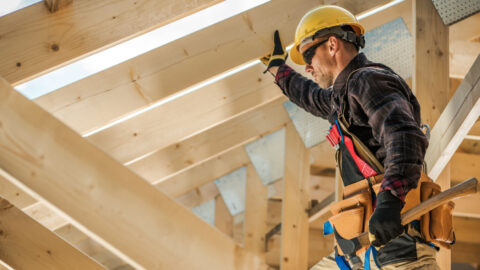Roof warranties shouldn’t be as hard to understand as they are. Fortunately, our aim in this blog is to answer the questions you may have when trying to understand roofing warranties. Here we offer the basics: If we don’t answer your specific question give us a call. We want to be as helpful as possible.
In this post, we cover:
- Manufacturer vs. workmanship roof warranties.
- What roof warranties do and don’t cover.
- “Prorated” vs “non-prorated” roof warranties.
- Roof warranty upgrade options.
Manufacturer vs. Workmanship Roof Warranties
Technically, you are buying two different things: a product (the roofing materials) and a service (installation of the materials). So you want to have both covered. You need a product or manufacturer’s warranty to cover the materials and a workmanship warranty to cover the labor.
What a Roof Warranty Covers
A manufacturer’s warranty protects you when there is shingle or other material failures. Essentially, it protects you from a product recall. If you were given a defective batch of shingles.
If the roofing product fails earlier than it should and the failure wasn’t due to workmanship or storm damage, then you probably qualify for a claim with the manufacturer.
Many shingles include wind warranty protection, guaranteeing you won’t lose shingles from the wind. It is also becoming popular to have a roof algae warranty in humid areas like Clearwater and St. Petersburg. You’ll want to be sure to hold on to purchase receipts in case you need to file a claim.
The workmanship warranty ought to be provided by the roofing company. This covers any issues that could arise within a certain time period because the crew made a mistake during the project. Typical workmanship issues could include nail pops, roof leaks or poorly installed flashing.
What a Roof Warranty Doesn’t Cover
A roofing warranty does not cover most storm damage from hail, debris, excessively high winds and tornadoes. No matter the quality of the material and how well the contractor installed your roof, some damage is unpreventable. Home insurance may cover this damage.
In addition to storm damage, critter damage is usually not covered under a warranty. So do your best to keep those squirrels, bats, birds and other pests out of your roof.
“Prorated” vs “Non-prorated” Roof Warranties
The standard product warranties extend to 40 years, but they are often prorated after five to 10 years. So, the amount of money they will offer should the materials fail will depreciate over time as your roof gets older. These are still great warranties, especially if you don’t plan to live in your home for more than five to 10 years. They also tend to have upgradable options.
Roof Warranty Upgrade Options
A new roof with architectural shingles typically has a “lifetime” warranty. Popular brands label their products as such. But it’s not your lifetime. In this case, “lifetime” refers to the expected lifetime of a shingle, around 40 to 50 years. Most manufacturers use warranties on properly installed roofs that last upward of 40 years against manufacturer and product defects.
Popular shingle manufacturers like GAF also offer extended roof warranties to trusted contractors (link to this story: https://docs.google.com/document/u/2/d/1dzr0Qr4N5Rm7mg3MAxxRGPpWDiiZvinSr0DEu53h5Fs/edit?usp=drive_web&ouid=104659113275958901070) certified in the installation and known to meet or exceed manufacturer expectations.
Some warranty upgrades also include a workmanship warranty through the manufacturer. This happens when a manufacturer trusts the contractor enough that they are willing to back up the work with their workmanship warranty. So, should the roofing contractor you hired go out of business, you’re still covered if something goes wrong.
Voiding a Warranty
There are many situations that can end with a warranty becoming null and void.
A poor installation or using incorrect materials can void your manufacturer’s warranty. It is necessary to research your roofing warranty before beginning your roofing project.
More scenarios that can impact your warranty are improper maintenance, using a new roofing contractor and mechanical damage.
Like most things in your home, your roof needs maintenance. If you live in an extremely wooded area, you’ll likely need to remove debris from your roof like you do your gutters. If neglected, the debris can start to decompose, breaking down your shingles and causing roof leaks.
Other examples include overhanging tree limbs, clogged and overflowing gutters, or siding and trim wood rot. Each of these issues — if neglected — could damage your roof and impact your warranties.
Using Another Contractor
Many roofing contractors have a clause that says if you utilize any other roofing contractor, you void your warranty. More lenient roofing warranties may only void the warranty in the area the repair was done.
Because contractors cannot vouch for the work of other contractors. If someone we don’t know works on a roof, we can’t know what condition the roof was in before the repair.
Contact your roofing contractor to fix any warranty issues before going to another roofer. Of course, if your contractor has a bad workmanship warranty, or stops returning your calls, it may be time to switch to a different contractor.
Mechanical Damage
This may not be the technical term, but the gist is that if another contractor does work that includes walking on your roof or doing work on your roof, it could void the roof warranty in those areas.
Sadly, contractors that aren’t roofers often don’t know how to protect your roof during a project. Sometimes they wear the wrong shoes. Other times they drill holes into the roof for harnesses, only to caulk them with the incorrect caulk later on. Naturally, your original roofer won’t cover these damages.
One unique mechanical issue we come across is power washing. Power washing can cause roof leaks in a hurry. Of course, a roof ought to be watertight, but if you spray an area with enough water and enough pressure, some water will get in.
If you need to clean your roof, a soft wash with a gentle cleaner is recommended. Otherwise, you could void both your workmanship and manufacturer’s warranties.
Transferring Roof Warranties
Most manufacturer warranties include a free, one-time warranty transfer. To transfer the warranty, you’ll often just need the date of purchase, the new owner’s contact information and documentation from the old warranty.
This can be found by going to the website for the roof shingle brand you used and searching “warranty transfer.” If you have any questions on how to transfer the warranty, contact your roofing contractor.
For workmanship warranties, warranty transfer policies differ from contractor to contractor. Ask your contractor’s policy if you are getting roof work done and plan to sell your home in the future. This way, you will be prepared with all the info you need when you sell the house.
How the Roofing Company Affects Your Manufacturer’s Warranty
Roofing manufacturers have strict installation guidelines for their roofing products. If your roofing contractor uses the incorrect materials, mixes different shingle brands or installs the roof differently than outlined, it can not only cause early roof failure but will also void your roofing warranty.
We can walk you through questions you have about insurance and warranties for your roofing project. John Hogan Roofing has given customers top-quality roofing services using premium materials for 30 years. Reach out to us for a free estimate. We pride ourselves on providing homeowners in Clearwater, St. Petersburg and surrounding communities with excellent residential and commercial roofing repair and replacement.
HAVE THE WORK COMPLETED RIGHT THE FIRST TIME
You May Also Like:
A Homeowner’s Guide to the Florida PACE Program for Roof Replacement
In Florida, a strong, reliable roof isn’t a luxury—it’s a necessity. But with the high cost of replacement, many homeowners are forced to delay this critical work, putting their homes at risk. While options like home equity loans or personal loans exist, there is another powerful financing tool designed specifically for Florida homeowners: the PACE…
Read MoreBenefits of Integrating Solar Panels with Your Roof in Florida
In the Sunshine State, it’s no secret that the sun shines bright nearly all year long. Florida is not only a paradise for beach lovers but also an ideal location for harnessing solar energy. If you’re a homeowner in Florida, you’ve probably considered integrating solar panels into your home, especially as the state continues to…
Read More15 Crucial Questions to Ask Before Hiring a Roofing Contractor in Florida
In Florida, where hurricanes, heavy rain, and intense sunshine are part of everyday life, your roof is more than just a cover — it’s your home’s first line of defense. So, when it comes time for a roof repair or full replacement, hiring the right roofing contractor isn’t just important — it’s essential. Whether you’re…
Read More



